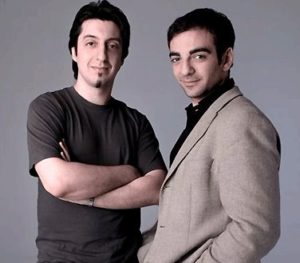The French Media Revolution : Success Story of Dailymotion
The Internet has drastically changed the way we communicate and share media. While, most media and documents were shared via email at first, due to lack of space and other such limitations, new platforms sprouted soon enough. Presently, we are all aware of the countless media platforms which are available on the World Wide Web, ranging from YouTube to Google Drive. But way back in the early 2000s, there weren’t so many options, and that is when Dailymotion came to the rescue, becoming one of the largest video-sharing platforms in the world.
Dailymotion is European video-sharing platform owned by the French media house Vivendi and has several partners such as BBC, Bloomberg and even VICE. Read on to see how two young French computer specialists changed the way we send and share videos, by turning Dailymotion from a small idea into an empire.
About the Founders
Benjamin Bejbaum was born in Paris, France on 20th November 1976 to doctor parents. He did his schooling from Gérard de Nerval High School, in Luzarches, from where he was suspended twice for being too lazy. Though most of the staff remember him as a lazy and laid-back student who preferred playing pinball to attending school, he managed to get good grades and passed his BA with Honours. He went on to attend the University in Villetaneuse, where he graduated in Mathematics and Information Sciences.

He was an insomniac who found it difficult to sleep, and in 1994, he found an excellent way to pass the time, i.e. with the night- gaming. With the internet and computing still in its infancy, Benjamin fell in love with computing and started teaching himself how to code. He soon started making websites and games of his own, and this later turned into a lifelong passion.
After getting turned down by his college due to his rebellious streak, Benjamin started to pick up odd jobs around time. He helped tourists in Orly, tried his hand at teleshopping and even worked at France Telecom. While trying his hand at college for the second time, he was approached by a cafe manager who offered him a job, and Benjamin quit college to start working for him. Together, they created websites and e-commerce platforms. Finally, in 2000, at the age of 24, Benjamin, along with his cousin brother, started Iguana Studio, a design company which helps people host websites.
On the other hand, Olivier Poitrey was born in 1978, in France and served as Dailymotion’s technical director up until 2015. He has a degree in graphic design and had worked at the Internet Club, freshly out of college. He later joined Digiweb, and this was where he met Benjamin Bejbaum. The two of them hit it off really well, and in 2005 founded Dailymotion.
Founding Dailymotion
Five years later, in 2005, while vacationing in New York, Benjamin took a few videos of the snowfall in Manhattan. But he was unable to send them to friends as there was no effective video sharing platform at that time. As a means to fill this void, he starts Short.tv, which was the first free site with automated video encoding. Soon, the site picked up momentum, and Benjamin dropped Iguana Studio to devote himself fully to Short.tv along with Olivier Poitrey. After a quick fundraiser, they agreed to rename their service Dailymotion.
The website started in Poitrey’s living room in Paris, with six members investing €6,000, in March 2005. By September 2006, the business roped in Atlas Ventures and Partech International and made them invest in the venture by raising over 7 million euros.
Video Rush hour: Success of Dailymotion
In 2009, owing to the growing popularity of the company, the French Government invested in the venture via a Strategic Investment Fund. In 2011, the media house Orange bought 49% of the shares of Dailymotion for €62 million, pricing the business at €120 million. But the company did not stop growing, and as the user base expanded, Orange bought the remaining 51% for €61 million in January 2013.
In May 2013, the government prevented Yahoo from acquiring a majority shareholding position in Dailymotion. Orange further pushed for an expansion of Dailymotion, trying for partnerships with Microsoft to increase the company’s presence and popularity in the US. Finally, Vivendi bought out Dailymotion from under Orange in 2015 by acquiring 80%, which they upgraded to 90% by September of the same year.
The platform soon grew and made several deals with international media houses such as Hearst Media and Bloomberg. Presently, it is available in over 25 languages with more than 43 local version serving localised content. Since then, Dailymotion has opened offices in London, San Francisco, Singapore and even, quite recently in Abidjan.
In the early days of Dailymotion, Benjamin served as the CEO and handled the company’s strategy. In June 2008, he stepped down from his position but remained a significant shareholder. Finally, in 2013, he sold off his shares in the company. In 2009, after he had resigned from Dailymotion, Benjamin launched ArtDB, which was a database of artworks and monuments. Olivier left Dailymotion in 2015, and joined Lycos Hosting, later joining Netflix in 2016.
With over 300 million monthly users, it is safe to say that the two young French boys started a largely successful and unique media revolution that changed the way we share video content.

Being a cinephile with a love for all things outdoorsy, Athulya never misses a chance to chase inspiring stories or poke fun at things, even when the subject is herself. Currently pursuing a degree in mechanical engineering, she is someone innately interested in technical and scientific research. Music reviews and op-eds define her as they allow her to explore different perspectives. Though sometimes she thinks she makes more sense playing the guitar than she does while writing.
